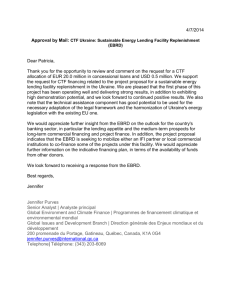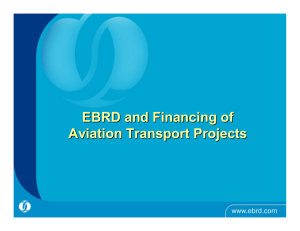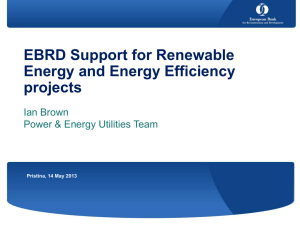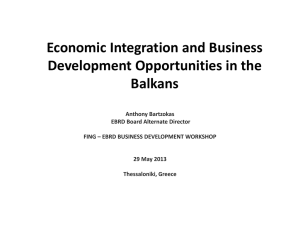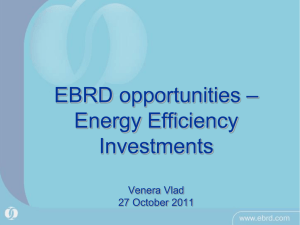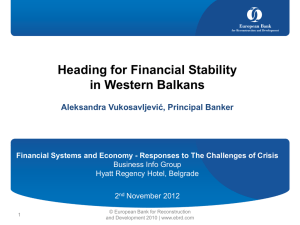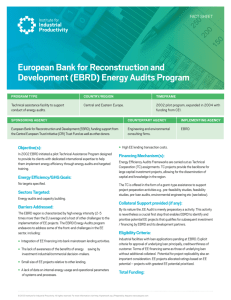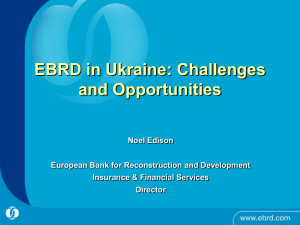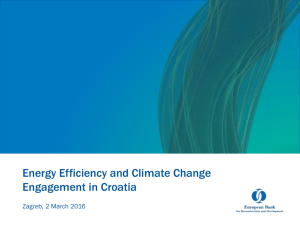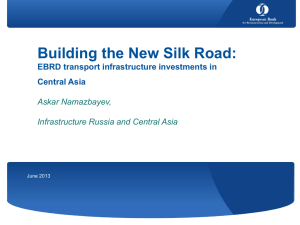Bulgarian Energy Efficiency for Competitive Industry Financing Facility
advertisement
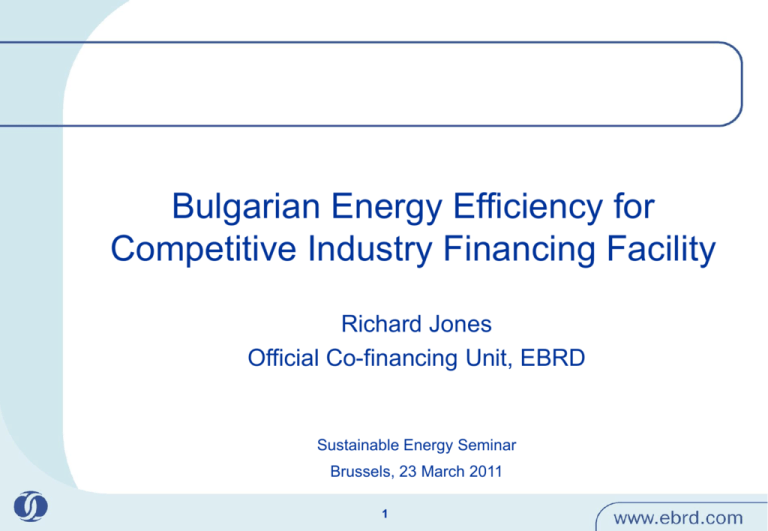
Bulgarian Energy Efficiency for Competitive Industry Financing Facility Richard Jones Official Co-financing Unit, EBRD Sustainable Energy Seminar Brussels, 23 March 2011 1 € billion What is the EBRD? 64 60 56 52 48 44 40 36 32 28 24 20 16 12 8 4 0 International financial institution, promotes transition to market economies in 30 countries from central Europe to central Asia Owned by 61 countries and two inter-governmental institutions Capital base of €30 billion* *At the Annual Meeting in Zagreb in May 2010, the Board of Governors approved the Bank’s capital increase from €20bn to €30bn authorised capital. '00 '01 '02 '03 '04 '05 '06 '07 '08 '09 '10 Cumulative commitments of €62.0 billion Unaudited as at 31 December 2010 2 EBRD in 2010 € billion Private sector > 79% of EBRD finance Debt 83%, Equity 17% of EBRD finance €9.0bn invested in 2010 55 10 45 8 35 6 25 4 15 2 5 -5 0 1997 1998 1999 2000 2001 2002 2003 2004 2005 2006 2007 2008 2009 2010 Debt ABV Reconciled as at 31 December 2010 3 Equity ABV Net Cumulative Business Volume Net cumulative business volume Invested over €62.0bn in more than 3,119 projects since 1991 Annual business volume (ABV) 65 12 Sustainable Energy Financing Facilities (SEFFs) Credit lines through partner banks for on-lending to investments in EE in the industrial sector, RE and residential EE Donor funded technical assistance from specialised consultants to Sub-borrowers and Participating Banks Incentive payments paid to Participating Banks and completion fees paid to Sub-borrowers upon successful implementation of eligible investments Successful track record: SEFFs are currently at the implementation stage in Bulgaria (industry and residential); Ukraine (industry); Georgia (industry and residential); Romania (industry); Slovakia (industry and housing associations) Kazakhstan (industry), Western Balkans (industry and public buildings), and Turkey (IEE, RE, REE, BEE, EES). 4 SEFFs: Main Achievements SEFFs – One of main instruments for EBRD to achieve its Sustainable Energy Initiative (SEI) Phase II targets (EBRD investment of EUR 3 to 5 billion during 2009-2011 in SE sectors) Since the first framework in Bulgaria in 2004, SEFF operations have now grown to 14 approved frameworks totalling EUR 1.3 billion supported by EUR 178 million donor funding Under these approved frameworks, 49 SEFF credit lines have been extended to 35 participating banks in 12 countries in the total facility amount of EUR 724 million (o/w EUR 344 million already disbursed) Aprox. 29 thousand sub-loans totalling EUR 281 million have been disbursed under SEFF credit lines, generating total expected energy savings of 3.9 TWh/year and CO2 emission reduction of 1.7 million tons/year 6 new SEFF frameworks currently under preparation. 2010 EBRD new commitments under SEFF expected to reach over EUR 350 million, almost tripled from preceding years 5 Bulgarian Energy Efficiency for Competitive Industry Financing Facility (BEECIFF) A financing vehicle created by the Bulgarian Ministry of Economy, Energy and Tourism and the EBRD (MoU signed on 02/03/2011) to promote energy efficiency investments among Bulgarian enterprises Combines EBRD’s credit lines and grant financing from Structural Funds (OP Competitiveness) Builds on the EBRD’s successful work with EE credit lines in Bulgaria where grant resources from Kozloduy International Decommissioning Support Fund were leveraged and combined with the EBRD commercial credit lines 6 BEECIFF: Strategic Importance This is a pilot project that brings together a number of innovative elements: – The Ministry will leverage substantially the SFs with private sector funding (both commercial lending and SMEs own funds) – The financial creditworthiness assessment is ‘delegated’ to the local financial institutions – The technical appraisal of the project will be entrusted to local energy auditors (registry of auditors) and cross-checked by Project Assistant who will be part of the Evaluation Committee in the Ministry This exercise should lead to the establishment of a sustainable model of operation between SME sector, energy auditors and local banks. If this is successful, this scheme may become a highly replicable model for other OPs and also in other member states. 7 BEECIFF: Objectives To boost competitiveness of SMEs through investments in energy efficiency and to strengthen the transition of Bulgaria towards a green economy To help leverage the absorption of Structural Funds allocated to Bulgaria under OP Competitiveness To strengthen capacities of local stakeholders involved in the implementation of OP Competitiveness To raise awareness on energy efficiency and energy efficiency financing opportunities among Bulgarian enterprises 8 BEECIFF: Main Challenges Complex legal and administrative setting: necessity to comply with Structural Funds regulations, Bulgarian law, and internal policies and guidelines of the EBRD A lengthy process of SFs grants approval and disbursement in Bulgaria: the Ministry took steps to simplify the grant payment cycle Necessity to put in place a parallel financing scheme (a loan facility managed by the EBRD and a grant financing scheme managed by the Ministry) since the management of the SFs resources could not be delegated to the EBRD 9 BEECIFF: the Role of the EBRD To transfer the Bank’s expertise acquired during the implementation of Sustainable Energy Efficiency Financing Facilities To secure financing and implementation of Programme Preparation Technical Assistance To provide parallel co-financing (“the Facility”) and ensure participation of local financial institutions 10 BEECIFF: Components of the Programme Loan Component: credit lines provided by the EBRD through Participating Banks (PBs) for on-lending to eligible SMEs Grant Scheme Component: resources provided from OP Competitiveness and managed by the Ministry of Economy, Energy and Tourism Technical Assistance Component: – Preparation support TA: financed and managed by the EBRD (in consultation with the Ministry) – Implementation support TA: provided and managed by the Ministry 11 BEECIFF: two implementation approaches A technology-driven approach for small-scale energy efficiency projects: to be eligible for financing, projects must consist of the acquisition and installation of equipment specified in a list of eligible materials and equipment An energy audit approach for larger and more complex energy efficiency projects: to be eligible for financing, each project will be analysed and screened against a set of requirements related to the ownership, type of activities, technical parameters, energy savings, environmental impact and financial viability 12 BEECIFF: Structure of the Programme Technical Assistance Programme Preparation Consultant Programme Steering Committee EBRD MoU Ministry of Economy, Energy and Tourism (Managing Authority of the OP Competitiveness) Grant disbursement upon completion and verification Credit lines to Participating Banks for on-lending to SMEs (“the Facility”) Participating Banks Energy Auditors TA Project Assistant SMEs – the final beneficiaries 13 TA Verification Assistant BEECIFF: Loan Component (“the Facility”) The EBRD will establish a finance facility under which the Bank will extend credit lines (up to a total amount of EUR 150 million) to local Participating Banks (PBs) Under the loan component of the Programme, PBs will on-lend EBRD financing to eligible SMEs PBs may participate in the verification of compliance with the requirements of the procurement procedures for the selection of the suppliers of services and equipment by the participating SMEs The loan repayment period will be negotiated between PBs and individual clients 14 BEECIFF: Grant Scheme Component The grant scheme component will be financed with OP Competitiveness resources Eligible projects will receive the grant financing subject to: (i) a project screening and verification of successful implementation to be carried out by consultants, (ii) obtaining financing from PBs under the loan component Grant intensity in the total financing provided for the implementation of each project will be in the range of 30-50% of the eligible costs (progressive grant intensity will incentivise more comprehensive energy efficiency solutions) 15 BEECIFF: Preparatory Technical Assistance Preparation support technical assistance package will be financed and managed by the EBRD in consultation with the Ministry. The consultant will: • Provide advice on the design and structure of the Programme (including technical aspects) • Assist with the implementation of a marketing strategy and raising awareness in the market regarding the Programme • Ensure transfer of skills and capacity building to all stakeholders participating in the Programme 16 BEECIFF: Implementation Technical Assistance Implementation support technical assistance package will be financed from the Structural Funds resources and will be managed by the Ministry. Among other tasks, the implementation consultants will: • Verify technical eligibility of proposed projects and present their recommendations to the Evaluation Committee • Identify an appropriate implementation approach (technologydriven or energy audit) • Ensure continuous training of energy auditors • Monitor projects’ implementation 17 BEECIFF: the Project Cicle Project Assistant SME (application form) (Technical Eligibility Confirmation Document) Participating Bank Contracting Authority Participating Bank (grant agreement) (loan agreement) (Financial Eligibility Confirmation Document) 18 Implementation phase Energy Auditors Verification Assistant (Completion Verification Certificate) Contracting Authority (Grant Disbursement) BEECIFF: Next steps and draft timeline • Programme preparatory support consultant to be selected in April • Procedures and technical documentation of the Programme to be finalised by autumn. At the same time, the Ministry will proceed with the selection of the implementation consultant • Possible start of the Programme by the end of 2011 19 Thank you for your attention! Richard Jones Director Official Co-financing Unit European Bank for Reconstruction and Development +44 207 338 7266 jonesr@ebrd.com 20
